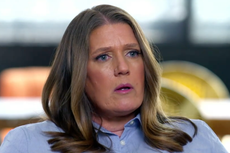Where recreational marijuana failed to pass in the 2022 midterms
Nearly half of Americans will now live in states where weed is legal after Maryland and Missouri passed legalisation referendums on Tuesday
Legalising marijuana was on the ballot in five states on Tuesday, but only two of those ballot measures passed as the remaining deep red states rejected the drug becoming regulated for personal consumption.
In Maryland and Missouri, voters approved the measures, bringing the total number of states where recreational use of cannabis is legal to 21.
Washington DC allows for recreational consumption of the drug, while 13 of the states across the country outlaw it entirely and the remaining states, which includes Arkansas, South Dakota and North Dakota, allow it for medicinal purposes only.
While the reasons for the ballot measure to pass in each of the three aforementioned states are varied, the one thing the three had in common is that they’re traditionally GOP strongholds with elected officials who ran strong platforms against the substance in the lead up to Election Day on 8 November.
Here, The Independent breaks down why each of the states failed to garner enough support for the recreational ballot measure and explains why other electorates, specifically Maryland and Missouri, managed to pull it off.
Maryland
In Maryland, the campaign to legalise recreational marijuana had been gaining robust support for some years before the measure, defined on the ballot as Question 4, was added.
“Question 4 activates long overdue changes to Maryland’s judicial, social, and economic climates. This is an important first step in the right direction,” said Maryland NORML Executive Director Losia Nyankale said in a statement Tuesday night.
Lawmakers had already approved legislation this year to take steps to changing the law regarding cannabis, but the General Assembly left matters of licensing and taxes for lawmakers to decide next year.
Medical marijuana in the state, which has been legal since a state law was enacted in 2013 to establish a state-regulated program, helped to normalise and reduce stigma around consumption of the drug.
The confidence that the ballot measure would pass was evidenced well before voters went to the polls, as the “Yes on 4” campaign, which was partly funded by medical cannabis giant Trulieve, ran a much more subdued campaign in the weeks and months leading up to 8 November, releasing a limited number of videos and holding a small number of rallies.
Instead, the state refocused their electorate’s attention on how the substance would be regulated, taxes and how they could come about with a more socially just and equitable introduction to the state’s market.
“Tonight voters in Maryland made history by bringing the era of failed marijuana prohibition to an end,” said “Yes on 4” campaign chair Eugene Monroe, a former Baltimore Ravens player. “For decades, the unequally enforced criminalization of cannabis in Maryland inflicted damage upon Black and Brown communities. We must turn the page on that disturbing history by centring Maryland’s legal marijuana market around racial equity.”
In the state’s constitutional amendment, it defines that recreational marijuana would not be legal until July 2023 for people 21 and over. Meanwhile, the state has enacted an interim period, starting on 1 January, where possession for a personal amount – up to 1.5 ounces – will be treated as a civil offence.
Missouri
Missouri proved to upset the trend on Tuesday and pulled away as the only conservative state with a recreational marijuana ballot measure on the docket to pass. The solidly red state, which came out strong for former President Donald Trump in both 2016 and 2020 and hasn’t supported any Democratic candidate since Bill Clinton in 1996, voted in favour of legalising cannabis, signifying the increasing support for a once-liberal issue.
That’s not to say it wasn’t a close race, as 53.1 per cent voted yes and 46.9 per cent voted no. But the Amendment 3 is now scheduled to go into effect on 8 December in the state, which was a bit slow to come around to legalising medical marijuana in comparison to the rest of the country, having only done so in 2018.
The temperature in the state seemed to change when Legal Missouri collected 400,000 signatures earlier this year to get the issue placed on the ballot. But despite the seeming progressive leanings of the measure, there was pushback on Amendment 3 from the state’s cannabis advocates who argued that the changes didn’t go far enough to expunge all nonviolent marijuana offences.
Moreover, the Missouri NAACP released a letter this year that actually encouraged people to vote no on Amendment 3, arguing that – if passed – would result in “the permanent exclusion of minorities from the cannabis industry in the state of Missouri.”
Arkansas
In Arkansas, South Dakota and North Dakota, the recreational marijuana measure failed to gain enough support in the conservative-leaning states.
Medical marijuana in the three states, however, is legal, counting them among the 37 other states across the country that have approved of the drug to be used for the treatment of chronic conditions.
In 2016, Arkansas became the first Bible Belt state to approve medical marijuana, with dispensaries opening in 2019 and now counting more than 91,000 patients out of the overall population of 3.026m in the state to carry a card to purchase the substance.
That enthusiasm, however, did not gain enough traction to support the recreational cannabis measure on Tuesday, with 55.81 per cent of voters saying no and 44.19 per cent saying yes.
The measure was sold to the electorate by conservatives as a trick by liberals, arguing that because part of the proceeds from the sale of the drug would go to law enforcement (with 15 per cent of tax revenue being allotted to state authorities’ budget) they were selling a “harmful drug … based on promises that look good”.
The state’s recently projected winner of the gubernatorial race, former White House speaker Sarah Huckabee Sanders, compared the Amendment 4 to supporting the opioid epidemic.
“I don’t think that with the drug epidemic that we have across this state, frankly across the country, that adding and giving more access to that does anything to benefit Arkansas, so I certainly wouldn’t be supportive of that,” said the Republican governor-elect earlier this fall.
Advocates for the measure, however, viewed getting it on the ballot as a step in the right direction.
“This initiative is a good first step toward Arkansas embracing a pragmatic cannabis policy,” said the state’s Democratic gubernatorial candidate Chris Jones, who conceded to Ms Sanders after garnering a little more than 35 per cent of the votes counted as of Thursday.
North Dakota
In North Dakota, the margin between the yeas and the nays on legalising recreational weed closed from the state’s previous vote in 2018, but not significantly enough for the measure to pass.
Four years ago, 59 per cent of voters said no to legalisation while on Tuesday, that dropped to 55 per cent with those voting “yes” jumping up four percentage points to 45 per cent.
It’s still quite recent that the state has come to embrace medical marijuana, having only passed it on a ballot measure back in 2016. Individuals suffering with debilitating medical conditions – such as cancer, AIDS, hepatitis C, ALS, glaucoma, and epilepsy – are legally allowed to purchase the drug for treatment.
Despite the measure’s rejection on Tuesday, there are signs that the border state is coming around to recreational use as in recent years its state legislature has passed laws that reduce criminal penalties and one that expanded the list of debilitating medical conditions.
South Dakota
Like its neighbour to the north, it was also the second time around for voting for legal recreational marijuana in South Dakota on Tuesday. The only difference being that the first time South Dakotans went to the polls, in 2020, the ballot measure – known as Amendment A – won a majority with 54 per cent of voters saying ‘yes’.
That majority would’ve seen South Dakota legalise recreational marijuana on 1 July 2021 and become the fourth state to pass the same measure on their ballots that year (Arizona, Montana and New Jersey). But because that ballot initiative also included a stipulation that the South Dakota State Legislature also establish a medical marijuana program and legal hemp sales by 1 April 2022, it was later struck down as unconstitutional because it violated the state’s single-subject rule for ballot initiatives.
It was later appealed at the state Supreme Court, but the decision was upheld.
One would think that with such precedent, the grounds would be paved for the ballot measure to pass (again) this election day, but the results (still being tabulated) projected that South Dakotans have rejected the measure with 52.9 per cent voting against and 47.1 per cent in support.
Like other conservative states, groups that were opposed to the measure were keen to paint the policy as one that would only intensify the opioid epidemic.
“We’ve had a lot of people ... say that (legalised marijuana) is going to make us wealthy, or that it’s going to make us well, and I just keep asking the same question: ‘When has the sale of any illegal drug done that?’” Protecting South Dakota Kids Committee, a group opposed to Initiated Measure 27, Chair Jim Kinyon said in an interview with The Argus Leader.
“That’s a lot of lipstick on a pig. And the good news is, in South Dakota most of us know what a pig looks like, and we know what one smells like.”
Join our commenting forum
Join thought-provoking conversations, follow other Independent readers and see their replies
Comments








Bookmark popover
Removed from bookmarks